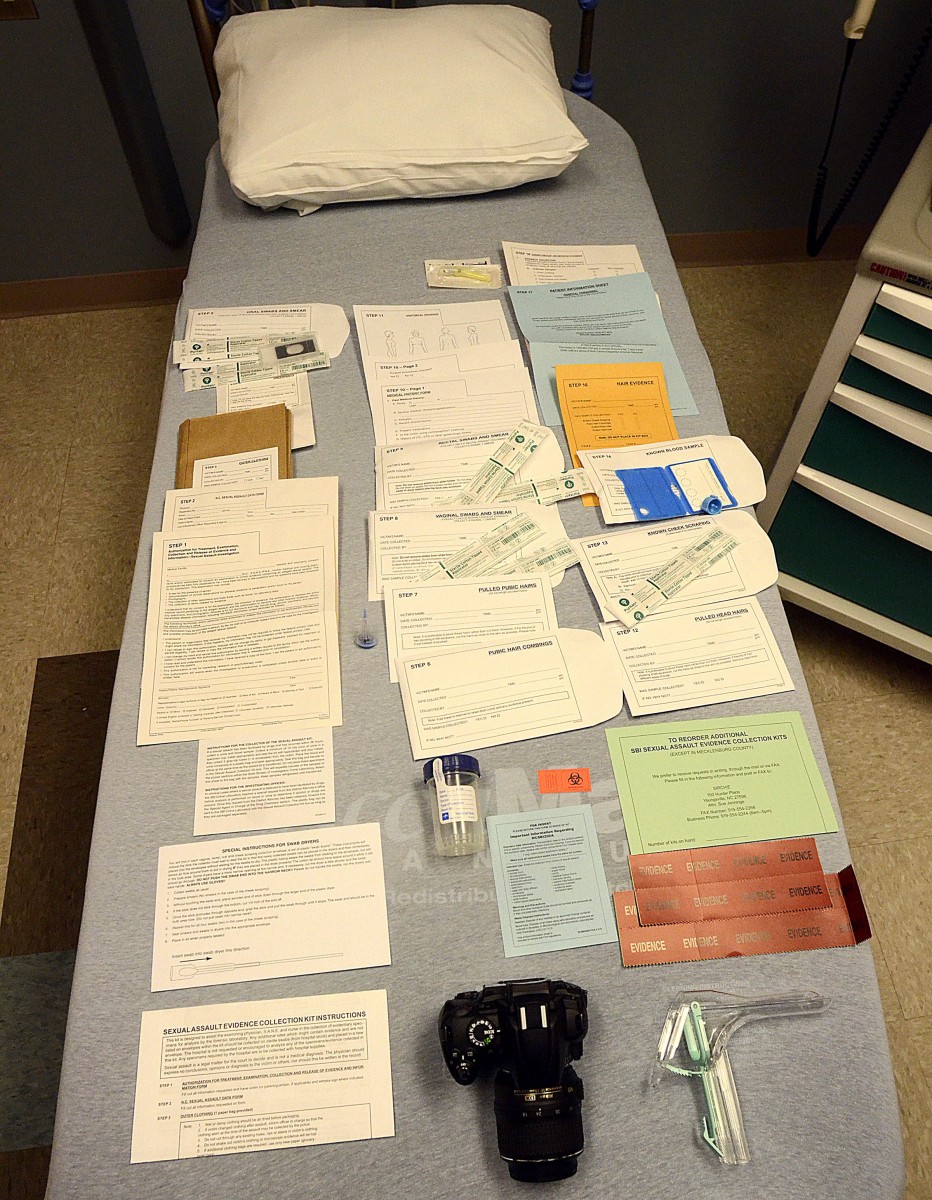This article was originally published by Carolina Public Press. Carolina Public Press is an independent, in-depth and investigative nonprofit news service for North Carolina.
About once per month, one of the two sexual assault nurse examiners at Frye Regional Medical Center in Hickory receives the call: A sexual assault patient needs an exam.
Sherry Shepard, the director of Frye’s emergency department, said the hospital conducts at least one sexual assault forensic exam, or rape kit, per month.
As a state-certified SANE nurse, Shepard has worked to collect forensic evidence from sexual assault patients since 2014.
Shepard’s certification allows her to perform an exam alone. A nurse who does not have a Sexual Assault Nurse Examiner certification would have to perform the exam with a physician, she said. To earn her certification, Shepard had to log long hours of meetings with attorneys and law enforcement and spend considerable time giving and observing the exams.
Someone who has been sexually assaulted may arrive at the hospital in a variety of ways.
“They may come in by EMS. They come in by police. They may come in by privately owned vehicle through our lobby,” Shepard said.
When patients arrive, they may not say they’ve been assaulted. Sometimes they tell the front desk they need an injury checked out or they complain of pain or vaginal bleeding.
But, if the emergency department staff has reason to believe a sexual assault has taken place, hospital personnel immediately take action.
“We try to get those people back and sequestered as quickly as possible, because one, it is a traumatic event for them,” Shepard said. “They don’t need to be out touching other things or other people touching them because they are walking, living evidence.”
After a physician examines the patient to make sure there are no injuries that need immediate treatment, a SANE nurse will take over, or the physician and a nurse will begin the forensic exam.
“Once they give verbal and written consent, then you gather your supplies …,” Shepard said. “You’ve got to make sure everything is new and unopened. It can’t be contaminated.”
The first step is taking photos.
“One of the most beneficial things (for their case) is when we take pictures,” Shepard added. “And when you’re taking pictures, you’re asking someone to undress in front of you. You’re a stranger to them. You’re asking them to bare private parts. … It’s traumatic to the patient.”
This process can take up to an hour or longer, Shepard said. It all depends on the number of injuries because the photos have to be taken at different lengths and angles.
Overall, the kit takes two to four hours to complete. Shepard said she likes to take her time to let the patient have a moment to cry if they need to. Ultimately, a patient doesn’t have to submit to every part of the exam, but Shepard does take the time to explain to them why it is important.
After the photos, DNA collection begins. This includes swabs of the mouth, throat and genitals. Pubic hair samples are also taken.
The clothing the survivor wears to the hospital is taken as forensic evidence. At Frye, Shepard says hospital staff members try to have a family member or a friend bring fresh clothing. If that doesn’t work out, the survivor is given disposable underwear and scrubs.
At Shepard’s previous hospital, there was a closet of clothing provided by a local nonprofit for sexual assault survivors. A similar program is in the works for Frye.
Once the exam is finished, Shepard makes sure the patient will be taken care of beyond the emergency department.
“You make sure documentation is complete, they have information for follow-up with either a shelter if they can’t go home, with police if they need to fill out a report or with mental health, if that’s needed,” she said.
As for Shepard, her job is technically done once the kit is sent off. Sometimes a SANE nurse may be called to testify in court. Shepard has never had to do that.
In sexual assault cases, filing a police report is not required to have a rape kit done. However, if the assault involves a firearm or other weapon, Shepard says police must be notified.
In most cases, it is up to the survivor to decide whether or not to press charges.
If victims are unsure if they want to report their rape, the kit can be sent to the crime lab marked as anonymous. If survivors choose to have their kit tested in order to seek legal action, they can change their mind within a certain time frame, usually up to three years, Shepard said.
“I haven’t collected an anonymous kit in probably three years,” Shepard added. “Most people know (what they want to do) when they come in.”
Just because someone reports a rape or has a rape kit done does not mean someone ends up convicted of the crime.
The network reports that out of every 1,000 rapes, 995 rapists will not be convicted.
In data analyzed by Carolina Public Press, out of 12 defendants charged with sexual assault in Catawba County from 2014-18 whose cases had been resolved by June 30, four were convicted, including one by a jury verdict. Two additional cases were still unresolved.
[Find out more about the methodology.]
“I am shocked more people aren’t charged,” Shepard said.
As for what a “typical” sexual assault patient looks like, Shepard said the majority of them at Frye are women, and most patients have been assaulted by someone they know.
“It depends on the season,” she said. “During the summer, usually, when people are out and about. Sometimes it’s the other way. But the majority of time yes, it is someone they know.”
The network also reports that eight out of 10 rapes committed in the U.S. are by someone known to the victim.
While women are more likely to be sexually assaulted than men, one in 33 men will be the victim of attempted rape or completed rape, according to the network, whereas one out of six women will be the victim of attempted rape or completed rape in her lifetime.
Among gender identities, 47 percent of transgender people are sexually assaulted in their lifetime, according to a 2015 study from the National Center for Transgender Equality.
In Catawba County, there is a disparity between the number of sexual assault forensic exams performed compared to how many end in a conviction.
Frye completed at least 12 sexual assault exams in 2018. Hickory’s other hospital, Catawba Valley Medical Center, did 30 exams in 2018, according to Catawba Valley’s emergency department administrator Chuck Scronce. That brings the county total of exams to at least 42 in 2018.
Catawba Valley currently does not have a certified sexual assault nurse examiner, but all emergency department nurses receive training in that area annually, Scronce said.
Ultimately, Shepard said it’s her job to do her part to take care of the patient and make sure the forensic evidence in the case is handled correctly so justice can be served.
This article was originally published by Carolina Public Press. Carolina Public Press is an independent, in-depth and investigative nonprofit news service for North Carolina.
Contact Jordan Hensley, of the Hickory Daily Record, at [email protected].
Illustration by Mariano Santillan of Carolina Public Press.



